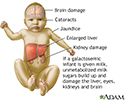Inborn errors of metabolism
Metabolism - inborn errors ofInborn errors of metabolism are rare genetic (inherited) disorders in which the body cannot properly turn food into energy. The disorders are usually caused by defects in specific proteins (enzymes) that help break down (metabolize) parts of food.
Enzymes
Enzymes are complex proteins that cause a specific chemical change. For example, they can help break down the foods we eat so the body can use them....
A food product that is not broken down into energy can build up in the body and cause a wide range of symptoms. Several inborn errors of metabolism cause developmental delays or other medical problems if they are not controlled.
There are many different types of inborn errors of metabolism.
A few of them are:
- Fructose intolerance
Fructose intolerance
Hereditary fructose intolerance is a disorder in which a person lacks the protein needed to break down fructose. Fructose is a fruit sugar that natu...
Read Article Now Book Mark Article - Galactosemia
Galactosemia
Galactosemia is a condition in which the body is unable to use (metabolize) the simple sugar galactose.
 ImageRead Article Now Book Mark Article
ImageRead Article Now Book Mark Article - Maple syrup urine disease (MSUD)
Maple syrup urine disease
Maple syrup urine disease (MSUD) is a disorder in which the body cannot break down certain parts of proteins. The urine of people with this conditio...
Read Article Now Book Mark Article - Phenylketonuria (PKU)
Phenylketonuria
Phenylketonuria (PKU) is a rare condition in which a baby is born without the ability to properly break down an amino acid called phenylalanine....
 ImageRead Article Now Book Mark Article
ImageRead Article Now Book Mark Article
Newborn screening tests can identify some of these disorders.
Newborn screening tests
Newborn screening tests look for developmental, genetic, and metabolic disorders in the newborn baby. This allows steps to be taken before symptoms ...
Registered dietitians and other health care providers can help create a diet that is right for each specific disorder.
References
Craigen WJ. Approach to inborn errors of metabolism. In: Goldman L, Cooney KA, eds. Goldman-Cecil Medicine. 27th ed. Philadelphia, PA: Elsevier; 2024:chap 189.
Shchelochkov OA, Venditti CP. An approach to inborn errors of metabolism. In: Kliegman RM, St. Geme JW, Blum NJ, et al, eds. Nelson Textbook of Pediatrics. 22nd ed. Philadelphia, PA: Elsevier; 2025:chap 104.
Galactosemia - illustration
An infant with galactosemia is unable to use (metabolize) the simple sugar galactose, which reaches high levels in the body, causing damage to the liver, central nervous system and various other body systems. An infant with galactosemia may develop jaundice, vomiting, lethargy, irritability and convulsions.
Galactosemia
illustration
Newborn screening testing - illustration
Blood is routinely drawn from newborn infants for testing. Blood is obtained by a heel stick and collected on a special blotter paper. Routine testing usually includes phenylketonuria, thyroid function, hemoglobin S (sickle cell disease), and may test for other disorders. Newborn screening programs vary from state to state. Testing can be tailored to the local population, determining what routine testing should be done.
Newborn screening testing
illustration
Galactosemia - illustration
An infant with galactosemia is unable to use (metabolize) the simple sugar galactose, which reaches high levels in the body, causing damage to the liver, central nervous system and various other body systems. An infant with galactosemia may develop jaundice, vomiting, lethargy, irritability and convulsions.
Galactosemia
illustration
Newborn screening testing - illustration
Blood is routinely drawn from newborn infants for testing. Blood is obtained by a heel stick and collected on a special blotter paper. Routine testing usually includes phenylketonuria, thyroid function, hemoglobin S (sickle cell disease), and may test for other disorders. Newborn screening programs vary from state to state. Testing can be tailored to the local population, determining what routine testing should be done.
Newborn screening testing
illustration
Review Date: 4/8/2025
Reviewed By: Anna C. Edens Hurst, MD, MS, Associate Professor in Medical Genetics, The University of Alabama at Birmingham, Birmingham, AL. Review provided by VeriMed Healthcare Network. Also reviewed by David C. Dugdale, MD, Medical Director, Brenda Conaway, Editorial Director, and the A.D.A.M. Editorial team.





